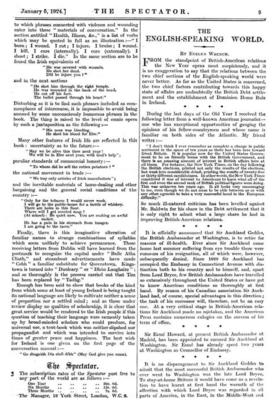IRISH CONVERSATION.
M EL
IT is a truism that the adoption of a universal language would be a great step towards the ending of differences between tiation and nation ; and the troth of the converse proposition is made increasingly clear by the 'post-War history of each territory which has been transferred to a State whose official language is different from that of its former master. In Slovakia, for example, the compulsory substitution of a Slavonic language for Magyar is a measure taken by the Prague Government to consolidate the spirit of the new Republic ; and with such determined fervour is this policy pursued in Czecho-Slovakia that the historic name of Joadhitnsthal has been replaced by Jachymov. In German-speaking Bohemia the substitution of " Karl6vy Vary " for Carls- bad is by many people regarded merely as a joke ; but in less-educated Southern Slovakia there are school children in Bratislava (formerly Pressburg or, in Hun- garian, POzsony) who are proud to be beaten for speaking Hungarian to their Czech school teachers.
Distant and " Balkan " as tales of this kind sound, there is a parallel very near home indeed. The Govern- ment of the Irish Free State has taken up the traditional association of Irish national feeling with the Irith national language, and this language is being taught there at a regular subject of the school curriculum. There can be no objection to this from the educational point of view if the learning of the Irish language involves an adequate mental discipline, if the materials of teaching it are systematic enough, and if the reading of a literature is the main end in view.
On the first two of these points, however; doubt is admissible. The text-book of Irish grammar in most general use in Irish schools, until recently at any rate, is, we understand, one compiled by members of a religious community, and its instruction is less methodical than could be desired. With it is used a book called Materials of Irish Conversation, which also is far from perfect ; many of its English phrases are Of an idiom unknown in England, and much of the " material of conversation " is of a kind whose use no one would wish to be permanent, for it closely reflects the- present turbulence of Irish affairs.
In these books a nationalist propaganda is to be found here and there in such phrases as "Co rnairidhltr nGaelithan shin!" (Mayour Irish language prosper.) But perhaps, the most significant fact is the large extent. to which phrases connected with violence and wounding enter into these " materials of conversation." In the section entitled " Health, Illness, ice.," is- a-- bet of verbs which .may be quoted In full as an illustration :7--" I burn ; I wound. I cut ; I injure. I bruise ; I wound. I kill. I cure (internally). I cure (externally). I shoot ; I strike. I die." In the same section are to be found tho Irish equivalents of " He was COVered with wounds. He shot her dead. Did he injure you 1" and in. the next sections "Me shot him through the right temple.
He was wounded in the back of the head. He cut off his foot.
The bullet passed through his heart."
Disturbing as it is to find such phrases included as com- monplaces of intercourse,.it is impossible to avoid being amused by some unconsciously :humorous phrases in the book. The thing is raised to the level of comic opera by such a juxtaposition as the following t--
" His nose was bleeding. He shed his blood for Eine."
Many other features of Irish life are reflected In this book : uncertainty as to the future:—.
" May we be alive this time _next •year
We will be in Eire next year, with God's help";
peculiar standards of commercial honesty To wlioni did he sell the rotten potatoes ? "
the national movement in trade :- " We buy only articles of Irish manufacture"; and the inevitable materials of horse-dealing and other bargaining and the general social conditions of the country " Only for the tobacco I would never work.
1 go to the public-house Per a bottle of whiskey.
There are holes in this floor.
Where will I .get scented soap (At- school) : Be quiet now. You are making an awful racket.
He has a pain in his stomach from Wager. I am wiling to the races."
Finally, there is this imaginative alteration of familiar names to strange combinations of syllables which seem unlikely to achieve permanence. Those receiving letters from Dublin will have learned from the postmark to recognize the capital wider " Belle Atha Cliath," and steamboat advertisements have made " Cobh " a familiar substitute for Queenstown. Kings- town is turned into " Dunleary " or " Dhuu Xdaogbaire " ; and so thoroughly is the process carried out that Tim has been replaced by. " Tadbg."
Enough ,lias been said to show that books of the kind from which some at least of young Ireland is being taught its national language are likely to cultivate neither a sense of proportion nor a settled mind ; and as those under review display no qualities of scholarship, it is clear that great service would- be rendered to the Irish people if this question of teaching their language were •earnestly taken up by broad-minded scholars who could produce, for universal use, a •text-book which was neither slipshod nor propagandist and which was intended to survive -into times of greater peace and happiness. The best wish for Ireland -is one given on the first page of the conversation manual :— " Go dtugaidh Dia chill dibh" (May God give you sense).















































 Previous page
Previous page